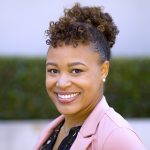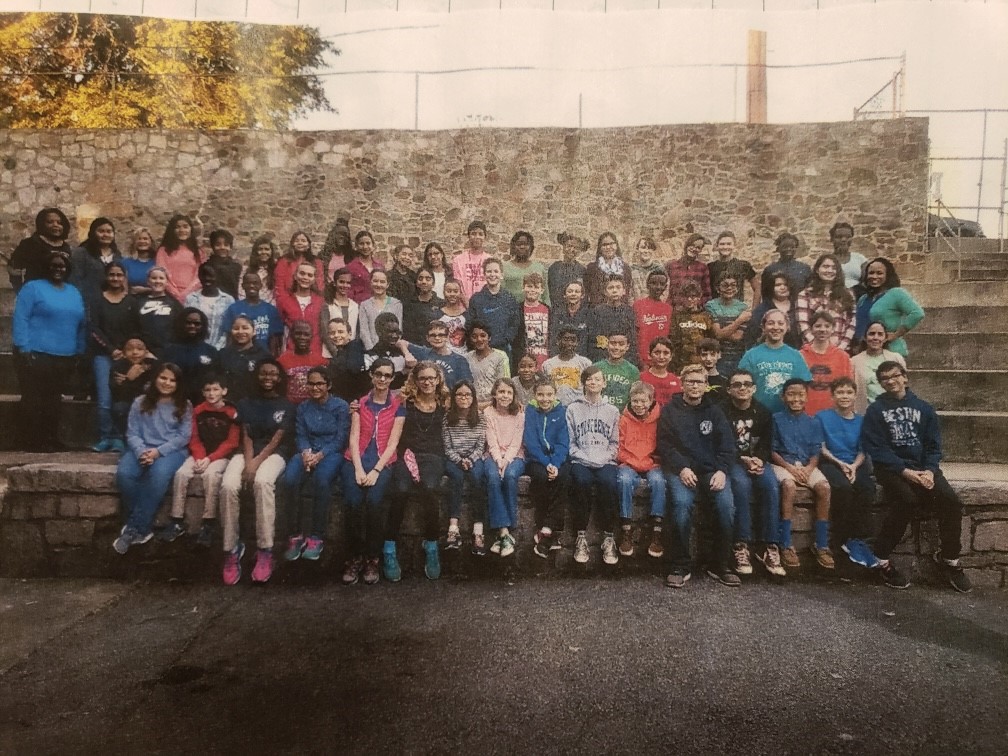
Khamia Powell
Fourth-year PhD candidate in UCI’s School of Education
- Celebrating Pride Month: Canton Winer Goes Above and Beyond
- New Fellowships
- Going for Gold Inside and Outside of the Classroom
- GradService Center
- UCI’s Alvin Garcia Selected for Prestigious Fellowship
- Dalton Salvo sees simulated classrooms as the future
- Contact Us
- Graduate Federal Work Study
- Contact Us New
- News
- Mentorship Program
- Making History by Changing the Way It’s Taught
- Privacy
- Recent PhD Graduate and Commencement Speaker Danisha Jenkins is Just Getting Started
- Alumni
- Past Events
- Events
- Current Students
- Test
- Test import
- Prospective Students
- Home Page
- Well-Being at UCI
- Professional Development
- Postdocs
- Industry Partners
- Funding
- Employers
- The New UMoMA Opens its Doors
- Sample Page
- Diversity, Equity & Inclusion
- Admissions
- About
- Blog
- Contact
Making History by Changing the Way It's Taught
UCI is a special place where innovative research takes place every day. It is a place where leaders are shaped for the future and life-changing discoveries are made. Whether it’s research to find a cure for cancer or an effort to finally support long term life on Mars, big things are happening at UCI. However, for Khamia Powell, a fourth-year Ph.D. candidate in UCI’s School of Education, her research has taken her down a much different path.

Khamia doesn’t need find out how much hydrogen or how many gallons of liquid oxygen it will take to get to Mars. She doesn’t need to figure out how to stop cancer cells from dividing inside the human body. What she needs, is to understand how changes in Jayden’s environment produce such drastically disparate outcomes.
Jayden? Is that a new planet or a new type of cancer? No and no.
Jayden is a person. He is a special, bright, and talented seventh grade student who loves to erupt in a lyrical freestyle at any given moment, although waits to rap a detailed synopsis of Ms. Powell’s history lesson at the end of each class- an agreement which fulfilled his inclinations, yet reinforced the lesson content for others. His ability to do this was actually a gift that went unnoticed by other teachers. Normally a happy teenager in Ms. Powell’s class, Jayden’s attitude was noticeably different one particular morning as he marched into history class.
“History for the longest time has been taught from a single lens.”
-Khamia Powell
“I remember it vividly,” Khamia recalls. “Jayden came into class, slammed down his books, and said ‘Ms.——doesn’t like me!’.” I got the others started on an activity and we stepped aside where I asked him why he thought that, and he explained how he was treated differently than the other kids in her class and expressed how maybe school just wasn’t for him.”
Differently? Exactly what did he mean?
“I was curious,” adds Khamia. “A couple of days later I casually spoke to the teacher who had triggered this drastic change in his disposition. She said that Jayden was such a pest in her classroom and was not well behaved. She went on to say that he was disruptive and didn’t even care about school. I thought to myself, well that couldn’t be more different than how he acts in my class. He’s never been anything but respectful, cheerful, and an overall stellar student.”
There was one obvious and distinct difference between the teacher and Jayden. Jayden was a Black student, and the teacher was white.
That’s when Khamia knew her life may have a new purpose. As much as she loved teaching and adored her students, she became profoundly aware of her desire to influence, perhaps even change the way teachers taught. It was time for her to become “a teacher of teachers”. It became her new life mission and the focus of her research.
“My principal knew I had strong relationships with students, but also recognized my capacity for working with and collaborating with other teachers,” Khamia says with a chuckle. “It is not something I went out of my way to do, it just happened. But I realized that I viewed situations from my own lens, based on my race, ethnicity, my culture, and my background. Therefore, what I understand and experience may be drastically different than someone else. I then became intentional about considering this in my teaching practice and created classrooms and now professional development that seeks to do the same.”
Khamia then goes on to explain another common misconception about her research.
“It’s always interesting to me when someone says, ‘I don’t see color.’,” she says. “When people say that, it is intended to be a positive sentiment of “sameness,” meaning everyone is alike and because of that they don’t acknowledge differences, consequently assuming that everyone shares a common experience. That is not the case. It is important to acknowledge one’s race because it recognizes and affirms one’s personhood, acknowledges that circumstances and experiences are particular to individuals, and thus our lived experiences likely differ. Teachers with “color blind” ideologies render students of color invisible in classrooms. Which was likely why Jayden felt so disconnected from his other teacher.”
“For the longest time, History has just been taught from a single lens,” Powell says. “But the reality is, many Black, Indigenous, People of Color, have contributed to the world, yet those histories are missing from modern curriculum. To be an inclusive classroom all students should be provided opportunities to see themselves positively represented in a curriculum so in turn they can see themselves as future scientists, artists, mathematicians, etc. Students like Jayden come to think school is not for them because they don’t feel seen, understood, or represented in classrooms.”
Khamia’s current research examines the influence of a teacher intervention that focuses on the development of empathy and color consciousness. It strives to design a method to develop teacher pedagogy in a way that facilitates, motivates, and supports the enactment of culturally responsive pedagogy. However, as fulfilling as it is for her, the decision to pursue her Ph.D. was one of the most bittersweet decisions of her life.
“I remember telling my seventh-grade classes that I was applying to graduate school at UCI,” says Khamia. “I also remember thinking to myself, if I get in, I get in. If I don’t I’ll stay here, and I’m happy with that too. I didn’t know what to expect. One morning before class I checked my email and saw that I received my acceptance letter. I cried, feeling such a whirlwind of emotion. I wasn’t sure if it was because I was happy that I got in, or sad that I was leaving my kids. I realized, it was both.”
“Later that morning, when I came into class, I put what you might call a guessing game on the whiteboard where the class had to figure out what my big news was. They guessed it immediately. The cheers of excitement were followed by dead silence. We all knew this meant I had to leave them. That was the hardest part.”
While Khamia’s acceptance to UCI meant she was temporarily leaving the classroom, it also meant the world was about to benefit greatly from her knowledge. Khamia has developed her skill and pedagogy as an educator with over 10 years of experience in Title I schools. She is certified in Early Childhood Education, Middle Grades Social Sciences, STEM, and Gifted/Exceptional Learners. Additionally, she has collaborated with the Department of Education to develop the a World History Social Studies curriculum that integrates culturally responsive research-based practices that engage both teachers and students in the learning process.
In her current research, Khamia has partnered with a local high school in California, to implement a professional development that aims to create more inclusive classroom cultures and a more representative curriculum. One of the greatest challenges is developing educators in ways that allow them to feel empowered and committed to implementing more culturally responsive teaching practices to meet the growing and shifting demands of educating a more diverse student demographic.
“This is why this type of research is so important,” says Powell. “The United States is becoming more diverse than ever, so teachers must be developed and empowered in ways that facilitate the enactment of more culturally responsive practices. We want the best for our children, but gaps likely exist because of this disconnect- as was evident with Jayden in the two very different classrooms that produced very different academic and social outcomes. Change begins with our teachers taking a more inclusive approach to learning, teaching, and interacting with diverse student populations.”
Khamia is still in the data collection phase of her research. While others’ research may have suffered because of the events of the last year, Khamia’s preliminary results have been incredible based on thousands of student survey responses, student focus group data, and over one hundred teacher survey responses. These have all informed the design of a professional development program that she’ll implement in the upcoming months with the teachers.
“Honestly, as challenging as this last year has been with a global pandemic, social injustice, and political upheaval, these events brought heightened awareness to my research,” Khamia says. “The principal and administrative staff enthusiastically embraced my research and have collaborated with me every step of the way, relative to access, time, and dissemination of measures. The only questions they ask are ‘how can I help more or what else do you need?’. What I find most encouraging is the acknowledgement that change is not only needed, but from all indications, it’s wanted. That is what gives me hope.”
Khamia’s stellar research led her to receive an Inclusive Excellence Ambassador Fellowship from Graduate Division last summer.
“It was wonderful to see Khamia receive the Inclusive Excellence Ambassador Fellowship,” says co-advisor and Distinguished Professor Jacquelynne Eccles. “Her research has a chance to change the way we think about how our students are taught moving forward.”
Dr. Adriana Villavicencio, her other advisor says, “Khamia’s research will deepen our understanding of how students of color experience school, while testing the efficacy of an intervention focused on racial equity. Both are critical in addressing the impact of systemic racism on marginalized students.”
Fellows were selected for their academic achievement and their commitment to inclusive excellence. They received a $5,000 summer stipend to support their research and are expected to remotely mentor incoming graduate students who are first-generation and/or from a minority serving institution to help them prepare for the start of their graduate studies at UCI.
So while Khamia may not discover the cure for HIV/AIDS nor solve the global warming crisis, she will create a process whereby the teachers’ lenses are developed in ways that allow them to create more equitable learning environments and opportunities for every student. These will be inclusive environments where students feel seen and can belong, curriculum where they feel represented and acknowledged, and thus can see their lives in the foundation of this nation and thus feel free to dream big dreams. This work is for the benefit all students, but especially the Jaydens.